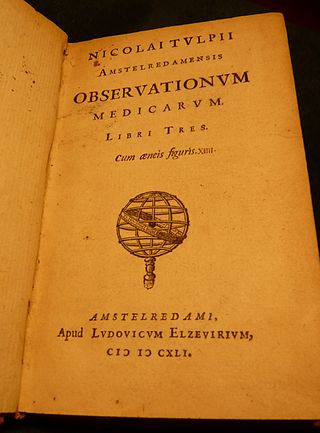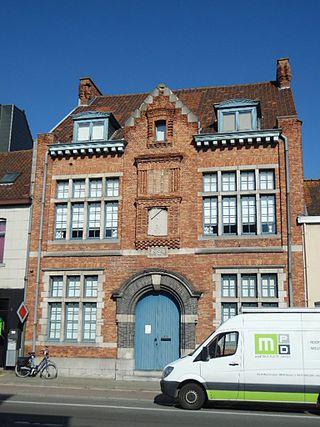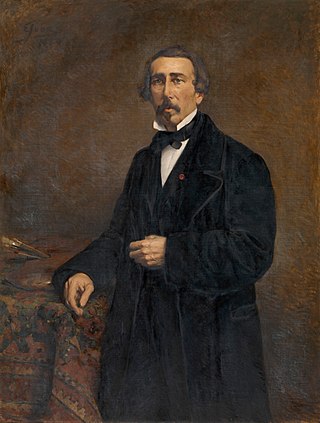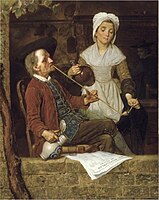
Lokeren is a city and municipality located in the Belgian province of East Flanders, and belongs to the Waasland, also called Land van Waas, of which it is the second most important city after Sint-Niklaas. The city, located on the river Durme, the Lede, and the E17 motorway, has more than 42,100 inhabitants who are called Lokeraars or Rapenfretters. Because Lokeren is located on the Durme, Lokeren is often called "The Durme City". Horse sausages are officially recognized as a regional product.

Lodewijk Elzevir, originally Lodewijk or Louis Elsevier or Elzevier, was a printer, born in the city of Leuven. He was the founder of the House of Elzevir, which printed works such as "Two New Sciences", written by Galileo, at a time when his work was suppressed for religious reasons. Although the House of Elzevir ceased publishing in 1712, the modern Dutch Elsevier company was founded in 1880 and took its name from the historic Dutch publishing house.

Koninklijke Sporting Club Lokeren Oost-Vlaanderen was a Belgian professional football club based in the city of Lokeren, in the province of East Flanders. The club was founded in 1923 but ceased to exist in 2020 after going bankrupt. A few days after the bankruptcy, the club announced that rather than dissolving entirely, it would merge with KSV Temse to form Lokeren-Temse, starting in the Belgian Second Amateur Division.

Frans Bonduel was a Belgian road bicycle racer.

Petegem-aan-de-Leie is a village in the Belgian province of East Flanders and a borough of Deinze. Petegem-aan-de-Leie is located on the south bank of the river Leie (Lys). The village today forms a single urban core with that of Deinze itself, which is located just across the river.
Léon-Eugène-Auguste Abry (1857-1905) was a Belgian painter who specialized in military scenes

Jan Swerts was a Belgian painter of historical subjects and portraits who worked on many publicly funded commissions. He played a major role in introducing German Romantic historical painting into Belgium. His fresco's using oil paint heralded a revival of a colouristic style derived from Rubens and the Flemish Baroque combined with historical and psychological realism.

Adriaan Jozef Heymans was a Belgian impressionist landscape painter.

Jacobus Albertus Michael Jacobs, known as Jacob Jacobs was a Belgian landscape and seascape painter in the Romantic style, with a preference for northern and "oriental" scenes.

Modest Huys was a Flemish impressionist and luminist painter, who is regarded as one of the greatest Belgian painters of the 20th century.
Auguste Philippe de Peellaert was a Belgian officer who, after his military career, became a painter, composer, and writer.

Hendrik Frans Schaefels or Henri François Schaefels, also known as Rik Schaefels, was a Belgian Romantic painter, draughtsman and engraver known for his seascapes, cityscapes, genre paintings, landscapes with figures and history paintings. He worked in the Romantic style popular in Belgium in the mid nineteenth century and was highly esteemed in Europe for his representations of historic naval battles.

Mark Verstockt or Marc Verstockt was a Belgian multidisciplinary artist. Since the 1950s he has been working on an oeuvre containing paintings, drawings, sculptures, publications, video and his own theory about form. His work has shown itself in different styles over time as lyrical abstraction, constructivism and minimalism. An overall constant is his fascination for the geometric figures such as the circle, the triangle and especially the square.

Gonzales Franciscus Casteels was a Flemish painter. He worked in Antwerp and is known for two works depicting battle scenes.

Andreas Johannes Ludovicus baron van den Bogaerde van Terbrugge was a Dutch nobleman, politician, author and art collector. He served as Governor of North Brabant between 1830 and 1842.

Jan Baptist de Smet was the 14th Bishop of Ghent and the 15th Bishop of Ypres.
Ernest Welvaert was a Belgian painter.
Basile De Loose was a Belgian painter.
Camille Wauters was a Belgian painter.




















